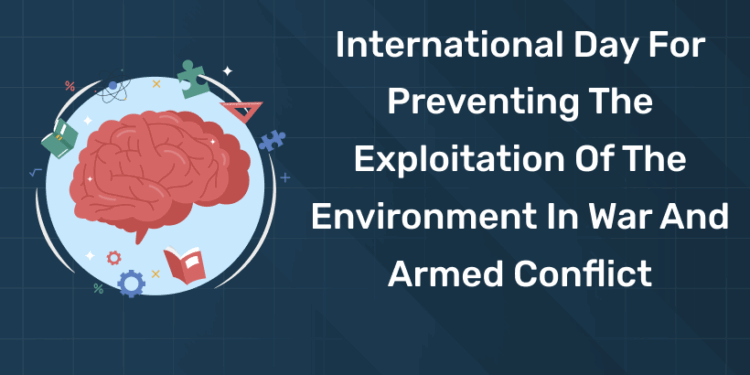Table of Contents
The International Day for preventing environmental exploitation during the war and armed conflict is observed on November 6. The day aims to ensure that the environment is not destroyed during incidents of armed confrontations. The environment has often remained a silent victim of wars and armed conflicts, as war casualties are usually counted in terms of the dead or wounded or the destruction caused to livelihoods and cities.
Though humanity has always counted its war casualties in terms of dead and wounded soldiers and civilians, destroyed cities and livelihoods, the environment has often remained the unpublicized victim of war. Water wells have been polluted, crops torched, forests cut down, soils poisoned, and animals killed to gain military advantage.
International Day for Preventing the Exploitation of the Environment in War and Armed Conflict 2025 Quiz
International Day for Preventing the Exploitation of the Environment in War and Armed Conflict 2025 Date – November 6
In this article readers can get a glimpse on
- History and Significance of International Day for Preventing the Exploitation of the Environment in War and Armed Conflict
- International Day for Preventing the Exploitation of the Environment in War and Armed Conflict Theme 2025
- International Day for Preventing the Exploitation of the Environment in War and Armed Conflict Quiz
Background for International Day for Preventing the Exploitation of the Environment in War and Armed Conflict
1: Who was the first woman President of India?
The World Day for preventing environmental exploitation during the war and armed conflict was established by the United Nations General Assembly on November 5, 2001, during Kofi Annan’s term as UN Secretary-General.
The UN Environment Assembly adopted a resolution in May 2016, which highlighted the significant role of healthy ecosystems and sustainable resources in reducing the chances of armed conflict. On the occasion, the UN body also reaffirmed its strong commitment to the full implementation of the Sustainable Development Goals.
Keep reading to know bout the international day for preventing the exploitation of the environment in war and armed conflict 2025 theme!
Free UPSKILLING Courses!
Take your first step toward mastering in-demand skills, acing interviews, and securing top-tier jobs with Entri's free upskilling courses.
Start Learning!When was the day established?
The UN General Assembly on November 5, 2001, established November 6 as the International Day for Preventing the Exploitation of the Environment in War and Armed Conflict. The day is observed annually across the world to spread awareness regarding the same and ensure the protection of the environment and ecosystem under any circumstance.
Why was this day established?
The United Nations Environment Programme revealed that in the last 60 years, almost 40 per cent of the internal conflicts were linked with the exploitation of scarce and high-value natural resources such as fertile land, water, timber, diamond, gold and oil. The UN programme found that conflicts over natural resources were twice more likely to relapse in comparison to other conflicts.
The Theme for International Day for Preventing the Exploitation of the Environment in War and Armed Conflict 2025
The official theme for the International Day for Preventing the Exploitation of the Environment in War and Armed Conflict for 2025 is not yet publicly announced by the United Nations.
- This International Day is observed annually on November 6th.
- The themes for these international observances are typically announced closer to the date by the relevant UN bodies, such as the United Nations Environment Programme (UNEP) and the UN General Assembly.
Free UPSKILLING Courses!
Take your first step toward mastering in-demand skills, acing interviews, and securing top-tier jobs with Entri's free upskilling courses.
Start Learning!What do People do on this Day?
Many people around the world, including government officials, scientists, journalists, educators, and business people, observe the UN’s International Day for Preventing the Exploitation of the Environment in War and Armed Conflict. Those who take part in the day spend time discussing how the effects of war are damaging to the natural environment. They also work together to find ways to limit environmental destruction caused by armed conflict and war.
Seminars, speeches, lectures, news articles, radio talks, and classroom activities in schools that focus on the topic are some of the events that take place on this day. People learn and share information about the dangers of new technologies in war such as depleted uranium ammunition, which poses unknown threats to the environment. People around the world are also made aware that all efforts must be taken to limit environmental destruction caused by conflict.
Significance of this Day
According to the UN, ensuring the protection of the environment is a part of conflict prevention, peacekeeping and peace-building strategies, as there can be no durable peace if the natural resources that support and sustain livelihoods and ecosystems are destroyed.
Quotes for International Day for Preventing the Exploitation of the Environment in War and Armed Conflict
There are many quotes that are circulated throughout the globe via internet. People share and discuss about the issues and how it can be minimized. The most common target during the conflicts has been the environment, as forests have been cut down, water wells polluted, crops burned, soil poisoned and animals killed. At the time of war, it affects the ecosystem such as water supply being poisoned, the forest being burnt, animals killed, etc.
International Day for Preventing the Exploitation of the Environment in War and Armed Conflict Quiz 2025
A) Water
B) Oil
C) Timber
3. How many countries have experienced environmental damage due to war since 1990?
A) Around 35
B) Around 50
C) Around 70
A) 10%
B) 20%
C) 30%
5. Which region has been most affected by conflicts over water resources?
A) Africa
B) Asia
C) Middle East
A) 30%
B) 40%
C) 50%
A) Forests
B) Wetlands
C) Deserts
A) United Nations Energy Program
B) United Nations Environment Programme
C) United Nations Environmental Policy
A) 2000
B) 2001
C) 2002
Want More Engaging Questions?
Download our FREE PDF packed with insightful quiz questions to test your knowledge!
🔽 Click below to get your free copy now! 🔽
International Day for Preventing the Exploitation of the Environment in War and Armed Conflict Quiz 2025 PDF
The International Day for Preventing the Exploitation of the Environment in War and Armed Conflict reminds the world that protecting nature is vital for peace. Environmental destruction caused by wars affects not only ecosystems but also the well-being and survival of communities. By recognizing the deep link between peace and the planet, this observance encourages nations to act responsibly during and after conflicts. It highlights that sustainable recovery and peacebuilding begin with respecting and restoring the environment.
As global awareness grows, this day inspires cooperation and accountability for environmental protection. Governments, organizations, and individuals are urged to integrate environmental care into peace efforts. Through education, advocacy, and responsible policies, the world can prevent future ecological harm. This collective action ensures that nature remains a symbol of healing, not a casualty of war.
Free UPSKILLING Courses!
Take your first step toward mastering in-demand skills, acing interviews, and securing top-tier jobs with Entri's free upskilling courses.
Start Learning!Frequently Asked Questions
What is the International Day for Preventing the Exploitation of the Environment in War and Armed Conflict?
This international day is observed on November 6 every year. It highlights how wars and conflicts harm the environment and human livelihoods. The United Nations established it to remind the world that nature also becomes a silent victim of war. It focuses on preventing environmental destruction during armed conflicts. The day promotes peace and sustainability by linking environmental protection with global security.
Why did the United Nations create this observance?
The UN created this day to emphasize the importance of protecting nature during wars. Many conflicts have damaged forests, water sources, and wildlife habitats. These losses affect human health, agriculture, and recovery after war. By establishing this day, the UN urges countries to include environmental safety in peacebuilding efforts. It also helps promote accountability for environmental crimes committed during conflicts.
How does war affect the environment?
Wars cause deforestation, soil erosion, and air and water pollution. Bombings and oil spills destroy ecosystems and wildlife habitats. Toxic chemicals from weapons contaminate soil and rivers, harming local communities. Refugee movements also increase pressure on natural resources. These impacts can last for decades, slowing recovery and worsening poverty.
What role does the United Nations Environment Programme (UNEP) play?
UNEP monitors environmental damage in conflict zones and provides technical assistance for recovery. It studies the long-term effects of war on natural ecosystems. UNEP also helps governments rebuild sustainably after conflicts. The organization supports policies that reduce environmental risks during military operations. Its reports guide global action to protect the environment in times of crisis.
How are natural resources linked to conflicts?
Competition over valuable resources like oil, gas, and water often triggers tensions. In many cases, armed groups exploit these resources to fund their activities. Poor governance and resource inequality can fuel violence. Managing natural wealth fairly can help prevent future wars. Therefore, protecting and sharing resources sustainably is key to maintaining peace.
What international laws protect the environment during war?
The Geneva Conventions and their protocols include rules that safeguard nature in conflict. These laws prohibit deliberate attacks on the environment. The UN also promotes legal frameworks against using natural destruction as a warfare tactic. However, enforcing these laws remains a challenge in modern conflicts. Strengthening accountability helps prevent further environmental harm.
How can environmental protection support peacebuilding?
Healthy ecosystems provide food, water, and livelihoods for war-affected communities. Restoring damaged lands helps rebuild economies and trust. Joint conservation projects can unite opposing groups through shared goals. Sustainable resource management reduces tensions over scarcity. Thus, protecting nature can lay the foundation for long-term peace and cooperation.
What are some real-world examples of environmental damage caused by war?
During the Gulf War, oil fires in Kuwait created massive air and soil pollution. Conflicts in Africa have led to deforestation and wildlife poaching. In Syria, damaged water systems caused severe public health crises. Chemical contamination from bombings has affected farmland in many regions. These examples show how war’s damage extends far beyond human losses.
How can individuals support this international observance?
People can raise awareness through campaigns and educational programs. Supporting environmental and peace organizations is another step. Learning about sustainable living and resource use also helps. Students and communities can organize events to discuss peace and ecology. Small actions collectively contribute to protecting the planet during crises.
Why is this day important for future generations?
It teaches the value of peace and environmental care together. Protecting nature during conflicts ensures resources for future generations. Awareness encourages governments to adopt eco-friendly defense and recovery policies. It reminds the world that peace is not complete without environmental security. The day inspires global responsibility toward a sustainable and peaceful planet.













